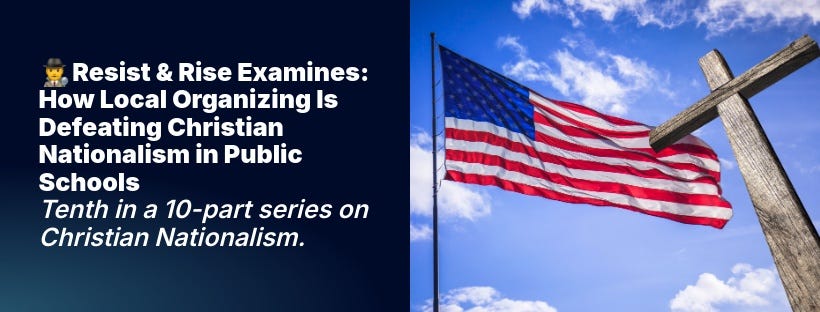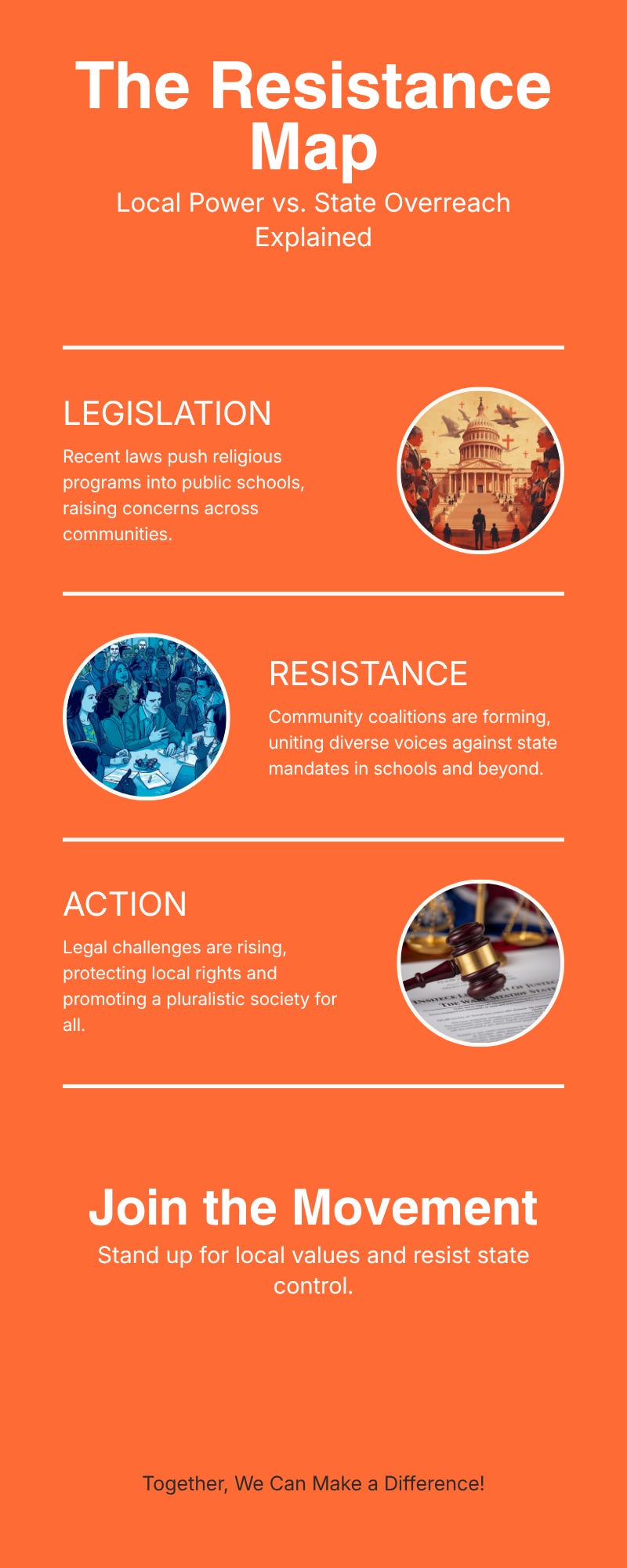How Local Organizing Is Defeating Christian Nationalism in Public Schools
Resist & Rise Christian Nationalism Series—Week 10
Forever Discount Only Available for a Limited Time—Thanks for Your Consideration
Faith leaders, parents, and unlikely Republican allies are defending religious freedom and blocking Christian nationalist overreach—one school board at a time.
Something’s happening across America. Grassroots resistance to Christian nationalism in public schools is racking up wins. Real ones. Oklahoma blocked its religious charter school. Texas districts are refusing school chaplains. And the coalitions making it happen? They include faith leaders, parents, and Republicans who get the danger of mixing government with religion.
Here’s what winning actually looks like.
Last May, the Supreme Court deadlocked 4-4 on Oklahoma’s attempt to create the nation’s first publicly funded religious charter school. That tie meant the state court’s rejection of St. Isidore of Seville Catholic Virtual School stood. Justice Amy Coney Barrett recused herself. For anyone who cares about church-state separation, this was huge.
But the courtroom is just part of it. This victory came from a coordinated resistance strategy that’s been building in red and blue states—legal challenges combined with local organizing, interfaith coalitions, and support from Republicans who see what happens when government establishes religion.
At the 2025 National Prayer Breakfast in February, President Trump said God saved him from an assassination attempt. He told Americans to “bring religion back,” adding “we have to bring religion back much stronger.” That rhetoric captures what organizers have warned about for years: an explicit push to merge Christian identity with American government.
The data tells a different story, though. In 2024, only three in ten Americans qualified as Christian nationalism Adherents (10%) or Sympathizers (20%). Meanwhile, two-thirds were Skeptics (37%) or Rejecters (29%). In California, New York and Virginia, over 75% of people said they were rejecters or skeptics.
The pluralist majority exists. Question is whether they’ll organize before it’s too late.
Part 9 in the Christian Nationalism Series:
Part 1 in the Christian Nationalism Series:
Local Communities Block Christian Nationalist School Policies in Texas and Beyond
Texas passed legislation in 2023 allowing schools to hire spiritual “chaplains” as counselors—part of a national push to insert religious authority figures into public education. But many school boards chose not to implement it. Local resistance worked.
In Mansfield, Texas, parent Megan Fanning connected with Christians Against Christian Nationalism organizers after the chaplain bill passed. She got toolkits, fact sheets, materials. Then she emailed her school board. “To have a field organizer from Christians Against Christian Nationalism come and speak at our school board meeting on behalf of our community against this chaplain policy meant so much,” Fanning said. “I like to think that community feedback might have made a difference in them voting against and rejecting the policy.”
This pattern keeps repeating: state legislatures pass aggressive Christian nationalist bills, then they stall at implementation. Amanda Tyler’s Christians Against Christian Nationalism campaign has drawn over 40,000 signatories, many from churches that once stayed out of politics. Now there are 13 community-led coalitions in 10 states responding to local needs and taking the message into public conversations about religious freedom in schools.
“These extreme policies passed by the legislature are not necessarily getting implemented because of local resistance,” Tyler told Religion News Service.
The leverage point is clear. Christian nationalists may have captured many state legislatures, but defending religious freedom in public schools requires local action. Every school board meeting is a battlefield. Every city council session is a chance to defend pluralism.
Faith Leaders Build Interfaith Coalitions Against Christian Nationalism
Rev. Dr. William Barber II and Rev. Dr. Liz Theoharis lead the Poor People’s Campaign, which addresses “at least 140 million people in the country who are impacted by the interlocking injustices of systemic racism, poverty, ecological devastation, militarism and the false narrative of Christian nationalism.”
Barber’s approach—what he calls “moral fusion politics”—deliberately crosses lines that usually divide Americans. “When people sit down across the lines that have tended to divide us – race, geography, sexuality – and then take an honest look at the politics of extremism,” he explains, “they figure out that the same people who are voting against people because they are gay are” also voting against healthcare, living wages, and public education.
This isn’t theory. Around 100 faith leaders associated with Milwaukee Inner-City Congregations Allied for Hope (MICAH) launched a “We All Belong” campaign protecting pluralism and religious freedom at local government meetings. In January 2025, over two dozen Black ministers issued “A Credo to Legatees of the Black Church Tradition,” calling for resistance through bold acts including economic empowerment and community investment.
The resistance is explicitly theological. Mara Richards Bim, justice and advocacy fellow at Royal Lane Baptist Church in Dallas, organized protests against immigration enforcement. “We don’t want state-imposed prayer,” she said, noting that “even within Christianity, we have a diversity of traditions.”
Republican Allies Join Fight Against Government-Funded Religious Schools
Here’s what’s underreported: the fracture within Republican ranks over Christian nationalist policies. Oklahoma’s Republican Attorney General Gentner Drummond filed suit against the Catholic charter school proposal in 2023, calling it a “potential cancer.” He said he’d continue “protecting our Christian values and defending religious liberty” by opposing taxpayer-funded religious charter schools.
Read that carefully. A Republican attorney general arguing that preventing government funding of religious schools is how you protect Christian values and religious freedom.
Drummond’s reasoning is both strategic and principled. If government can fund Catholic schools today, it can fund Islamic schools tomorrow. “The Supreme Court’s decision represents a resounding victory for religious liberty,” he said after the May ruling, emphasizing “that Oklahoma taxpayers will not be forced to fund radical Islamic schools, while protecting the religious rights of families to choose any school they wish for their children.”
This creates an organizing opportunity progressives have mostly missed. Principled conservatives worried about government overreach into religious affairs are potential allies in defending church-state separation. The argument isn’t just about defending pluralism. It’s about preventing the state from controlling religion.
Chief Justice John Roberts may have provided the critical fourth vote against the religious charter school, despite his previous support for religious school funding in different contexts. The institutional conservative concern about government entanglement with religion hasn’t disappeared. It’s been dormant.
Digital Organizing Tools Help Communities Fight Christian Nationalist Overreach
In September 2025, over 150 advocates from 22 states gathered in Dallas for the Religious Freedom in Public Schools Summit, led by Interfaith Alliance and cosponsored by Americans United, Baptist Joint Committee for Religious Liberty, Cooperative Baptist Fellowship, Freedom From Religion Foundation, Hindus for Human Rights, Muslim Public Affairs Council, National Council of Jewish Women, Pastors for Children, and Texas Impact.
They chose Dallas deliberately. Texas has passed laws allowing chaplains as school counselors, requiring Ten Commandments displays in classrooms (now facing legal challenge), mandating prayer time, and funneling public dollars to private religious schools—all key Christian nationalist policy goals.
“Texas is a testing ground,” said Rev. Alyssa Aldape of Americans United. “The strategies developed here often spread nationwide. So that’s why it is critical to understand not only what’s happening in Texas but how Texans are organizing to resist. Texas is a state of fighters and that there are good folks in this state fighting for our public schools.”
Laura McKee, field organizer for Christians Against Christian Nationalism, described how social media translates into offline power: “We’ve really seen the impact of online to offline organizing with TikTok. We multiple times have helped people develop their public comment that they’re going to go and share that evening at their local school board or city council meeting.”
Christopher and Mendi Tackett, a Texas couple, spent years connecting Christian nationalist organizations to Project 2025. In late 2023, Christopher posted a video warning about Project 2025 with the strategy “See It. Name It. Fight It.” Their grassroots effort helped catalyze mainstream coverage from outlets like The Washington Post and NPR pointing to the plan’s goal of “infusing Christian nationalism into every facet of government policy.”
What Christian Nationalism Resistance Victories Mean for Democracy
The resistance to Christian nationalism has three structural advantages organizers need to leverage.
Demographics favor pluralism. Christian nationalism support has stayed stable since late 2022 at around 30% of Americans. This isn’t a rising tide. It’s a well-organized minority that’s successfully captured institutional power through strategic organizing while the majority slept.
Overreach creates backlash. The Dobbs decision eliminating federal abortion rights energized millions of previously disengaged voters. Oklahoma’s attempt to mandate Trump-branded Bibles in classrooms was so extreme that 75% of superintendents refused to comply before the state Supreme Court blocked it. Christian nationalists are winning in legislatures but struggling at implementation because normal people—including many Christians—recognize authoritarian excess when they see it.
Local power remains democratic. Gerrymandered legislatures and a conservative Supreme Court pose real obstacles, but school boards, city councils, and county commissions remain directly accountable to voters. A packed school board meeting can still change outcomes. A coalition of parents, clergy, and educators can still block a chaplain policy or Ten Commandments mandate.
But these advantages only matter if the pluralist majority organizes with the same discipline and long-term commitment Christian nationalists have shown for fifty years.
What’s Next: Christian Nationalism Battles to Watch in 2026
The 2026 midterm elections will test whether resistance organizing can translate to electoral power. A majority of Republicans qualify as either Christian nationalism Adherents (20%) or Sympathizers (33%), creating a direct link between Christian nationalist ideology and partisan control. Swing districts and states will determine whether local resistance can scale to state and federal power.
Watch for:
• New religious charter school cases emerging in other states, potentially reaching the Supreme Court again in 2-3 years when Justice Barrett might participate
• State legislative sessions (January-May 2026) attempting to mandate religious instruction, display requirements, voucher expansion, and school chaplain programs
• School board elections in spring and fall 2026, where Christian nationalist megachurches are organizing coordinated takeover campaigns
• Trump administration policy implementation through Project 2025’s “180-Day Playbook,” particularly Department of Education guidance and DOJ civil rights division priorities
As Dahlia Taha of the Muslim Public Affairs Council argued at the Dallas summit: “Religious liberty is supposed to be America’s first liberty. But really, it’s a stress test, and nowhere is this test clearer than in our public schools. Public schools are arms of the state. When they deny religious accommodations, silence students, or trivialize harassment, they aren’t just failing young people. They’re failing the First Amendment.”
Take Action: How to Fight Christian Nationalism in Your Community
The playbook for defending religious freedom and blocking Christian nationalist overreach is working, but it requires participation:
Find your local coalition: Visit ChristiansAgainstChristianNationalism.org to connect with one of the 13 state coalitions or start your own
Attend school board meetings: Check your district’s calendar and prepare public comment on school chaplain programs, curriculum mandates, or Ten Commandments displays
Support legal challenges: Americans United, ACLU, and Baptist Joint Committee are litigating cases nationwide and need funding
Know your school board candidates: Ballotready.org provides detailed information on local races where Christian nationalist organizing is intense
Reader Question: What does resistance look like where you live? Have you witnessed local officials pushing back against Christian nationalist policies? Are people of faith in your area organizing to defend pluralism and religious freedom? Have you seen school boards reject school chaplain programs or Ten Commandments mandates? Share your story because democracy depends on ordinary people taking extraordinary action in their own communities.
Frequently Asked Questions About Fighting Christian Nationalism
How can I fight Christian nationalism in my local school district? Start by attending school board meetings, connecting with local coalitions like Christians Against Christian Nationalism, and preparing public comments on policies like school chaplain programs or religious instruction mandates. Local organizing is the most effective tool.
What states have passed Christian nationalist education policies? Texas, Oklahoma, Louisiana, and Florida have passed the most aggressive policies, including school chaplain programs, Ten Commandments display requirements, religious charter schools, and voucher programs that fund religious education with public dollars.
Are Republicans opposing Christian nationalism? Yes, some principled conservatives are joining the fight. Oklahoma’s Republican Attorney General Gentner Drummond successfully sued to block the nation’s first religious charter school, arguing it threatened religious liberty and church-state separation.
How effective is local organizing against Christian nationalist policies? Highly effective. While Christian nationalists control many state legislatures, local school boards and city councils remain democratically accountable. In Texas, many districts rejected school chaplain programs despite state authorization. In Oklahoma, 75% of superintendents refused to implement Bible mandates before courts blocked them.
Methods & Verification
All factual claims were cross-checked against primary sources including Supreme Court decisions, PRRI survey data (22,000+ respondents across all 50 states), organizational reports from Americans United and Baptist Joint Committee for Religious Liberty, and news coverage from NPR, Religion News Service, CNN, and local outlets. Supreme Court information verified through SCOTUSblog and official court documents. Quotes attributed to named sources with dates and contexts.
Sources:
PRRI American Values Atlas 2024
U.S. Supreme Court St. Isidore ruling via SCOTUSblog
Christians Against Christian Nationalism
Religious Freedom in Public Schools Summit coverage, KERA News, September 17, 2025
The Forward, “Christians against Christian Nationalism leader talks Trump,” February 18, 2025
Trump National Prayer Breakfast remarks, Voice of America, February 6, 2025
NPR, “Progressive Christians counter Christian Nationalism message,” October 22, 2025






